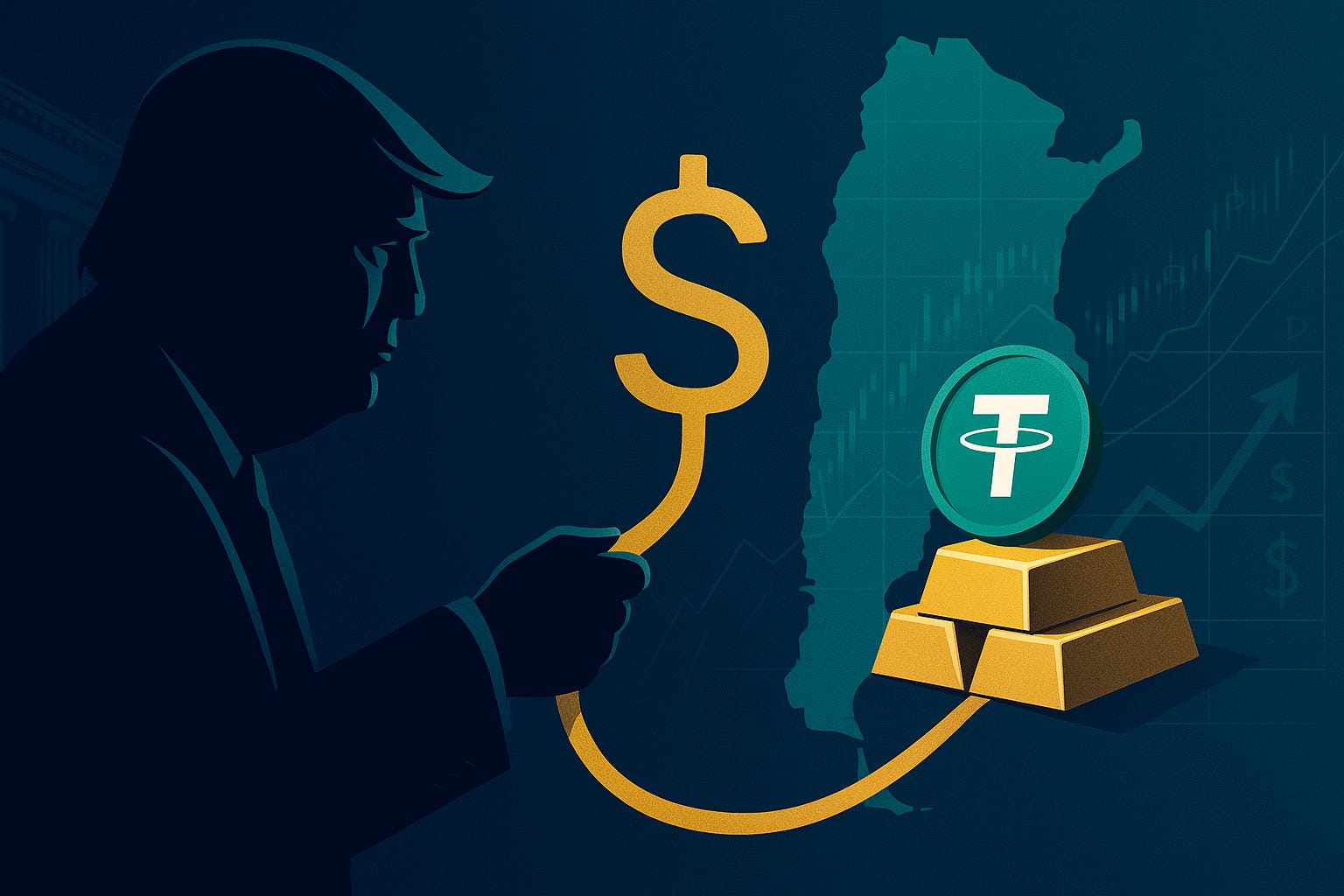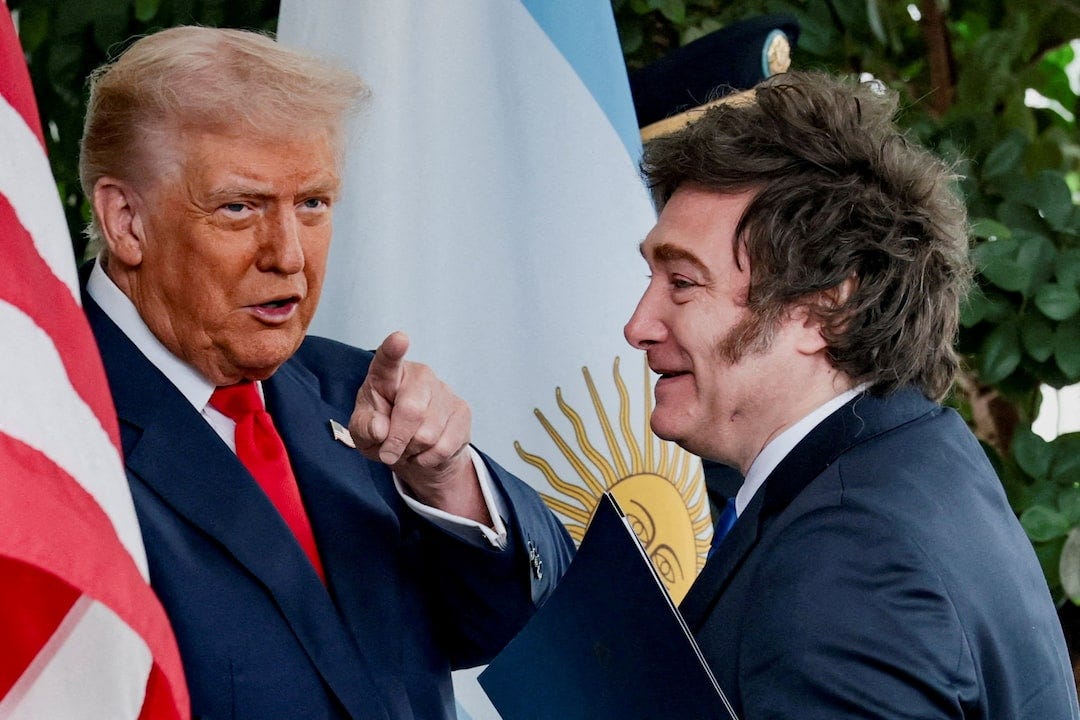New Analysis: Trump's $40 Billion Tether Rescue
Argentina's emergency bailout coincides with a crypto pardon and Tether's mad scramble to raise $20 billion. What’s the connection to Trump's newly minted crypto family fortune?
Two weeks ago, the U.S. Treasury did something extraordinary. It delivered a $20 billion currency swap to Argentina, began buying pesos in the open market, and orchestrated another $20 billion private facility for Buenos Aires’ sovereign debt. The official story: propping up President Javier Milei’s experiment in libertarian economics ahead of midterm elections.
The actual story is written in the timing.
The same fortnight Treasury moved to stabilize Argentina, Tether—the crypto industry’s $127 billion shadow bank—was racing to raise $15-20 billion while expanding a tokenized gold operation that suddenly became urgent after years of dormancy. Trump pardoned Binance founder Changpeng Zhao on October 23, eliminating the single largest regulatory threat to the exchange that provides Tether’s deepest market liquidity. And those Argentine beef import quotas that quadrupled to 80,000 tons? They directly benefit the agricultural empire Tether quietly bought control of earlier this year.
Put the pieces on the table and they form a picture: This is a Tether rescue, executed through the back door of geopolitical theater.
Trump Orders Argentinian Beef
Tether’s purchase of roughly 70% control in Adecoagro—a major grain and energy producer spanning Argentina, Brazil and Uruguay—was framed as crypto’s expansion into “real world assets.” The reality is starker. Tether welded its balance sheet to Argentine agricultural exports and peso stability at the exact moment that economy was sliding toward another currency crisis.
When Treasury steps in to stabilize Argentine debt and currency markets, it’s not just helping Milei. It’s underwriting the asset values and dollar liquidity flows that now sit at the core of Tether’s South American operations. The beef quota expansion? That’s revenue directly into Adecoagro’s supply chain, where Tether now controls the financial rails.
Argentina isn’t some abstract emerging market play for Tether. It’s become infrastructure. USDT stablecoins are how millions of Argentines actually hold dollars when their government won’t let them access the real thing. A peso collapse doesn’t just create political instability—it threatens redemption runs on USDT that could cascade through crypto’s entire dollar-substitute system.
The Gold Timing
Then there’s the gold. After three years of near-zero issuance, Tether’s XAUt gold token supply jumped by roughly 129,000 ounces—about $440 million—in a single August day. By October, Tether was marketing a $200 million “tokenized gold treasury” vehicle with mining partners, supposedly to stockpile more gold-backed tokens.
This looks less like product innovation and more like emergency liquidity management. Tether’s own attestations show nearly $200 million in previously minted but unsold XAUt as of June. Converting metal inventory and dormant tokens into cash under the friendlier narrative of “digital asset treasury” is window dressing. (Credit to Michel de Cryptadamus whose Substack analysis first highlighted the suspicious timing and scale of the XAUt expansion.)
The optics get worse. In 2024-25, Argentina’s central bank shipped portions of its gold reserves abroad for “financial certification” and later refused to disclose custody locations in U.S. court filings. There’s no proof those bars intersect with Tether’s vaults. But when Argentine gold moves offshore, XAUt supply spikes, and Tether suddenly needs $200 million for gold operations—all while Treasury backstops Argentine stability—the coincidence strains credibility.
The Pardon as Policy
Trump’s pardon of CZ wasn’t mercy. It was regulatory policy delivered through executive clemacy. Binance remains the dominant venue for USDT trading pairs. Every day CZ sat under a criminal conviction, counterparties priced in enforcement risk that threatened Tether’s market microstructure. Pardoning him was the fastest way to calm those calculations.
The pardon came days after Abu Dhabi’s MGX sovereign fund used Trump’s family-linked stablecoin USD1 in a $2 billion Binance investment. Trump created a direct money channel between his political brand, the world’s largest crypto exchange, and dollar-pegged tokens—then eliminated the legal overhang threatening that entire structure.
Paid subscribers can access a deeper dive below







